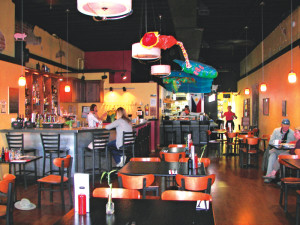By Ann Marie Swan
Like a siren’s song, economic development efforts are meant to lure new businesses to the Arkansas Valley. These efforts must also support and enhance deeply rooted local businesses. Keeping both pieces of the economic puzzle in mind, the billion-dollar question remains: how do we retain and create sustainable jobs while maintaining the area’s character and charm?
The members of the Chaffee County Economic Development Corporation (CCEDC) tackle this question daily. They’ll tell you there isn’t one answer, but a few. This corporation considers the big economic picture. Its purpose is to find solutions, manifest living-wage jobs and facilitate sustainable economic development. The CCEDC might as well shout from the mountaintops, “Chaffee County is open for business.”
“We’re part of an effort led by the governor to up the game of the economy,” said Wendell Pryor, director of the CCEDC.
Pryor acts as an intermediary and ombudsman between businesses, local governments and anyone involved in growing the economy in our region, which includes Lake, Fremont and Custer counties. The region’s strategy is part of a larger statewide action plan called the Colorado Blueprint, a bottom-up approach. This comprehensive, strategic plan identifies needs, priorities, visions, strengths and weaknesses throughout Colorado at a local, regional and statewide level. It aligns existing efforts and finds opportunities for growth and focused investments.
The number one priority for economic growth in Chaffee County and the region is broadband connecting. Broadband could potentially be a game-changer with consistent, reliable internet connectivity that isn’t interrupted by weather or cut lines. It will help grow familiar, deeply rooted businesses as well as enterprises interested in relocating here. And it’s all happening now. Soon, a 60-foot telecommunications tower over Salida will reach to towers on Methodist Mountain, Monarch Ridge and Mount Princeton. Broadband opens the doors to a wide range of companies that wouldn’t have given the Arkansas Valley a look, much less settled here.
Jeff Post, broker/owner of First Colorado Land Office, knows this all too well. Potential buyers who want to live outside of town and work online usually define this requirement early on. Without broadband, “discussions pretty well stop,” said Post, who is CCEDC’s chairman of the board. During the past year, Post has seen at least three potential buyers walk for this reason. From an economic standpoint, these buyers are the ideal newcomers. They bring their jobs and enroll their children in local schools. Having them here “would be a plus for community programs,” said Post.
Broadband will be a boon for our schools as well. iPads may become as common as notebooks in local kids’ backpacks. This connectivity makes the world smaller and allows rural areas to be part of the larger global economy, the new frontier of opportunities. Living in a remote but beautiful location becomes attractive if work is doable.
Broadband is the “infrastructure issue of the 21st century,” Pryor said.
It’s time to make new inroads. Currently, the first business cluster in Chaffee County is tourism. But despite our dependency on tourism, it doesn’t bring in enough money to create living-wage jobs that allow locals to buy homes.
Retirees and active seniors, drawn to the area for the healthy lifestyle, make up the second business cluster. This educated group enjoys the fitness and cultural aspects, and volunteers in the community. And they buy homes. It doesn’t hurt to have a regional medical center in Salida, along with the gamut of alternative medicine.
The third group is wholesale trade, such as clean companies with online sales and light industry. There are a number of success stories and much growth here. One example is Mark Swarny’s Custom Linings in Buena Vista. The company is a source for consumer and industrial polyurea protective materials, spray application equipment and technical support. Swarny’s products have lined truckbeds to reservoirs, and waterproofed manholes to mineshafts. “Anything that is made out of steel, we can make last longer,” said Swarny.
The company sprays foam insulation and coats foundations. As Swarny flips through photos of completed jobs from Denver to South Africa, the possibilities seem endless. Research and development is done on this property alongside the prison’s fence, yet the findings are far-reaching. Custom Linings has 150 business partnerships nationwide and in seven countries.
Swarny and his family came across Chaffee County about 10 years ago. They drove back home to Oklahoma City and turned around the next day. “We live here because we can,” he said.
When Swarny had an opportunity for a Climax contract, he needed to erect a 2,600 square-foot structure on his property in 40 days with no delays. He didn’t ask the county building department for anything out of the ordinary, just a timely permit. The CCEDC had Swarny’s back as he made his way through the permitting process. The CCEDC reiterated the importance of expediency in getting approval and landing the contract. Everything worked out and a shiny steel building, designed to hoist and accommodate mining equipment, stands tall.
Providing this business-support service is a key role for the CCEDC. It’s not just the actual red tape that turns off business owners but the perception of it, along with the time it takes to get something done. In October, the Chaffee County Building and Development Services departments announced reduced counter hours to tackle work uninterrupted. Maybe this decision will make a difference.
Swarny got lucky with his employees, saying the best members of their team walked in the door. “They want to be part of what we have going on,” he said. This is not the case for many local businesses. A common complaint is the laid-back, and lacking, workforce. “We have workforce gaps where we need more skilled workers and educated people who are working below their potential,” Pryor said. In terms of intellectual capital, “Salida is one of those hot properties,” he added.
CCEDC board members put their heads together on workforce development issues. Inevitably, vocational training becomes part of the discussion. Cultivating innovation and technology is also important. And it’s vital that new enterprises have access to lending.
CCEDC also backs up neighboring counties’ ventures. Economic development teams in the region wrote letters of support to state senators in Custer County’s quest for a national veterans cemetery. An Army veteran donated 930 acres of gently rolling land in the Wet Mountain Valley at the foot of the Sangre de Cristo range, 14 miles south of Westcliffe. “It’s a very peaceful place,” said Custer County Commissioner Lynn Attebery.
Judy Lohnes, executive director of the Upper Arkansas Area Council of Governments, works with these groups on a regional level to move their ideas forward and into the state plan. “We have a louder voice if we speak together,” Lohnes said. “We support each other to stand stronger individually.”
Together the groups pinpoint what each county has going on, and what needs attention. Some achievements include revitalized downtowns and vibrant art communities.
Before an economic development group can attract jobs, it must know its people. According to a CCEDC survey, the majority of locals who responded, 41 percent, live in Chaffee County because they are “in love” with the area. It’s a common story and a quality-of-life selling point.
Tourists drive through Chaffee County, become smitten and move here to set up businesses or get jobs. Discovering this welcoming, beautiful area is often by happenstance, like finding a gem. But, after being swooped up, the landing in reality can be hard.
The economic development groups also identify “under opportunities” in the region, such as the airports in Buena Vista and Salida. Longer taxiways and storage of jet fuel would put these airports on more maps. They could become holding stations during fire season, with smokejumpers staying nearby.
A helicopter company based in Europe worked out of the Buena Vista airport, taking advantage of the blue hole, a natural break in the clouds, to study its technology. Crew members couldn’t easily contact coworkers and families in Europe and were annoyed. Again, broadband enters the conversation.
Until new enterprises become commonplace, growing pains are inevitable. Kerry Nelson, owner of the local foods market Ploughboy Inc. in Salida, got so frustrated dealing with Salida administrators, that she closed her store and left town. The trouble didn’t concern her business, but sprinklers in her adjacent home. City and county staffers were never malicious, she said, but the back-and-forth between the two offices and the “uncertainty” made it a deal-breaker. In Nelson’s experience the city wasn’t “customer-service oriented” and “didn’t act like a government but like a private party,” she said. And not in a good way.
The city and county seemed confused and paralyzed by its own codes. Nelson had a sense staffers knew something wasn’t right but couldn’t “let go and move forward to a sensible solution, even as weeks rolled on and on,” she said. This “doubling down” became “impossible.”
After a lengthy, exasperating and expensive process, the law concerning sprinklers was clarified and changed in Nelson’s favor. But at this point, she was spent and almost ambivalent to the news.
Nelson’s story is unique because she returned to Salida and, ironically, the going-away party was the catalyst. Friends, customers and neighbors streamed through the doors, expressing gratitude for the food and friendship, and sadness about Nelson and her husband, Dave, leaving. “People here are so great, honestly,” she said. “I didn’t expect to enjoy standing in the store, helping here.”
Nelson mans the cash register on a busy afternoon, alternately preparing samples and talking up the next batch of roasted green chilies to a customer. Offering good, local food is just part of Nelson’s plan. Her vision includes “putting money back into people’s pockets,” she said.
Like an atonement for any previous hassles, the valley offers its unpretentious gifts. These are the moments when it’s easier to let go of the struggles of setting up a business. This is where it comes together in a satisfying way and makes sense. This is when it all feels worthwhile.
Salida resident Ann Marie Swan has worked as a daily journalist in Denver, Honolulu and Tokyo. She’s from New Orleans.



